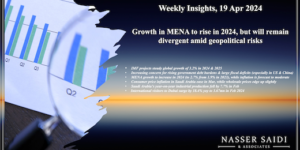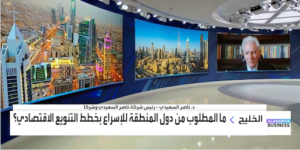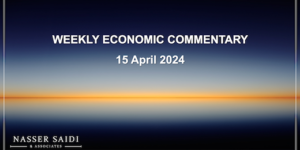Markets
Eight consecutive record daily closings lifted the Dow Jones above the 22,000 mark, in the wake of positive earning reports and strong macro data, especially on the US job market. The gains were notable in the financial sector, driven by expectations of higher yields. Even European bourses, which had been languishing for two weeks ended on the front foot, thanks in part to the euro depreciation vis à vis the dollar. Most other stock exchanges recorded weekly gains and the MSCI Global touched new highs before retrenching on Fri, while the MSCI Emerging Markets ended almost flat. Regional market were also mostly in positive territory. In currency markets the euro-dollar had a rollercoaster week climbing above 1.19 on Wed and then plunging almost 1% on Fri, barely changed over the week. The yen and the pound also lost ground to the greenback after the payroll numbers. Oil markets closed almost unchanged after experiencing a volatile week and gold prices dropped a few dollars per ounce amid sluggish trade.
Global Developments
US/Americas:
- The US non-farm payrolls, beating expectations, added 209k jobs in Jul vs 231k in Jun, while the unemployment rate retrenched to 4.3% (a 16 year low). Growth was broad based, but particularly strong in education and health services, leisure and hospitality. Average hourly earnings increased 0.3% mom (2.5% yoy) in July vs 0.2% (2.5% yoy) in Jun, the biggest increase in five months.
- The US PCE deflator was unchanged in Jun (1.4% yoy) as in May. The core PCE deflator rose 0.1%, mom (1.5% yoy) signalling that inflation pressures remain dim.
- The US ISM Manufacturing PMI fell to 56.3 in Jul from 57.8 in Jun, the highest since Aug 2014. New orders fell 3.1 points but remain perky at 60.4. The production and employment sub-indices declined, while inventories crawled up.
- The US ISM non-manufacturing index slid from 57.4 in Jun to 53.9 in Jul. The business activity index fell 4.9 points, while new orders lost 5.4 points. Even the employment component faltered from 55.8 in Jun to 53.6, the lowest since Apr.
- The US goods and services trade deficit narrowed to USD 43.6bn in Jun, USD 2.7bn lower than in May. Exports expanded by USD 2.4bn, while imports fell by USD 0.4bn.
- US nominal personal income was unexpectedly flat mom in Jun, vs 0.3% in May. Nominal disposable income was also unchanged due to nonwage income. The silver lining was growth of wages and salaries up from 0.1% mom in May to 0.4% in Jun.
- US personal spending edged up 0.1% mom in Jun, following a 0.2% rise in May. Gains were led by services while nondurable goods were sluggish.
- The US pending home sales index increased 1.5% mom (0.5% yoy) in Jun, ending its 3-month losing streak, and rising above its Apr level.
- US initial claims for unemployment benefits fell 5,000 to 240k. The 4-week moving average declined by 2,500 to 241,750. Continuing claims rose 3,000 to 1.968 million.
- US factory orders surged 3% mom in Jun after two months of decline. Civilian aircrafts drove the advance while orders and shipments of core capital goods were on the weak side.
- Brazilian industrial production rose 0.3% yoy sa in Jun, after a jump of 2% in May, another sign that the economic situation is slowly recovering.
Europe:
- The eurozone GDP in Q2 expanded 0.6% qoq (2.1% yoy, the highest rate in 5 years), following 0.5% (1.9% yoy) in Q3 as a result of stronger private consumption.
- The eurozone’s inflation rate remained at 1.3% yoy in Jul due to stable oil prices and the appreciation of the euro. Core inflation accelerated to 1.3% from 1.2% in Jun.
- Retail sales in the eurozone in Jun increased 0.5% mom (3.1% yoy) after a 0.4% (1.7% yoy) in May, the sixth consecutive monthly advance. Gains were recorded across most countries, but in Germany they were outstanding, while in France were marginally down.
- German manufacturing orders rose 1% mom (5.2% yoy) in Jun vs 1.1% in May. Domestic orders drove the improvement, while foreign orders declined.
- German retail sales went up 1.1% mom in Jun vs 0.5% in May, underlying an acceleration in consumption expenditure that is lifting GDP growth.
- The Bank of England left its rate unchanged at 0.25% and its asset purchases target at GBP 435 bn. Governor Carney remarked that uncertainty over the negotiations on Brexit is discouraging business investment and household spending.
- The UK nationwide Housing Price Index gained 2.9% yoy (0.3% mom) in Jul, just 2 decimals below the yoy increase in Jun (1.1% mom). In monthly terms, the indicator added 0.3%, building on a 1.1% rise in Jun. The numbers are remarkably upbeat after the recent disappointing figures.
Asia Pacific:
- Japan’s consumer confidence rose 0.5 point to 43.8 in Jul thanks to higher wages in May and Jun, but it is stuck well below the neutral 50-mark.
- India’s central bank reduced by 25bp its benchmark interest rate to a 6.5-year low of 6%, after inflation fell to a 5-year low of 1.25% yoy in Jun and economic growth faltered.
- South Korea’s inflation rate rose 2.2% yoy in Jul accelerating from 1.9% in Jun due to volatile food price.
- South Korea’s foreign trade surplus was USD 10.6bn in Jul, almost on par with the USD 10.8bn in Jun. Exports growth was perky thanks especially to electronics components.
- Thailand’s industrial production decreased -0.2% yoy in Jun vs +1.6% in May.
Bottom line: The stock market rally that was triggered by the hope of a political turn around ensuing Trump’s election seems to be immune to a sequence of political setbacks suffered by the new Administration. Investors shrugged off the dismissal and replacement of key figures in the White House and the appointment of a Grand Jury by special prosecutor Robert Mueller. For the time being, investors believe that the economic outlook justifies record high valuations especially in blue chips with the highest share prices, such as Boeing, 3M, Apple, McDonald’s and UnitedHealth. By contrast in Europe, where growth is gaining momentum, stock indices have come down from the highs touched in the spring.
Regional Developments
- The Qatar diplomatic row enters its third month, as the mediation efforts make no headway: the 4 Arab nations are proposing that the UN Security Council vote to impose sanctions against Qatar for violating counter-terrorism resolutions.
- Egypt’s PMI increased to 48.6 in Jul (Jun:47.2): though remaining below the 50-mark, new orders were steady for the first time in 21 months (rising to 50, from 46.3 the month before) while input costs rose partly given the removal of subsidies. Output continued to decline in Jul, but at the slowest pace in a year, rising to 47 from Jun’s 45.3.
- FDI in Egypt likely touched USD 8.7bn in 2016-17 fiscal year, compared to USD 6.9bn the year ago, according to the Investment Ministry.
- Egypt’s foreign reserves jumped by USD 4.73bn to USD 36.04bn at end-Jul: this surpasses reserves prior to the 2011 uprising.
- Trade deficit in Egypt narrowed by 46% yoy to USD 13bn in H1 this year, as imports declined by 30% to USD 24bn while exports grew by 8% to USD 11bn.
- As part of its reform programme, Egypt raises drinking water and sewage fees by upto 50%, effective immediately. The hike is expected to save about EGP 1bn in subsidies.
- Egypt expects to issue between USD 2-4bn in dollar-denominated eurobonds in Q1 2018, according to the country’s finance minister.
- Egypt’s external debt increased by 9.7% from end-Dec to USD 73.88bn in Jan-Mar this year.
- Egypt’s M2 money supply was up 39.4% yoy to EGP 2.92trn at end-Jun.
- Iraq began marketing its USD 1bn bond as the country attempts to finance its deficit; this is its first international debt issuance as a standalone credit since 2006. The initial price guidance for the bond, with a maturity of five and a half years, is in the low 7% area, reported Reuters.
- Iraq’s oil exports fell to 3.23mn barrels per day (bpd) in Jul (Jun: 3.273mn bpd); the average sale price in Jul was USD 43.8 per barrel, thereby generating USD 4.386bn in revenue.
- The IMF expects Jordan to grow at 2.3% yoy this year, following the conclusion of the Article IV consultation. The outlook for the country “remains challenging” despite “considerable progress and recent improvements” as highlighted by recovery in exports, tourism receipts and remittances this year.
- A group of 10 Chinese firms have signed land lease agreements for various projects in Oman’s Duqm for over USD 3bn of total investments. The projects include a USD 2.3bn methanol venture, a USD 406mn power project and a 5-star hotel.
- The Omani government has signed a USD 3.55bn 5- year loan agreement with a group of Chinese financial institutions, thereby covering the financing requirements for the 2017 fiscal deficit. The operation brings to over USD 10bn Oman’s external borrowing in 2017.
- Qatar announced that the cabinet had approved a draft law, granting permanent residency to the children of Qatari women married to non-Qataris, people with special talents “needed by the state”, as well as expatriates who provide outstanding services. Those holding permanent residency can not only access free state education and healthcare, but also have the right to own property and run some businesses without needing a Qatari partner.
- Qatar central bank’s net international reserves dropped by USD 10.4bn to USD 24.4bn in Jun – the lowest in at least 5 years.
- Imports into Qatar shrank 40% yoy and 37.9% mom to QAR 5.87bn in Jun; in comparison imports were down by only 0.3% yoy in May. Meanwhile LNG exports remained almost unaffected, with its exports rising 15.8% yoy to QAR 11.88bn (May: 21.6%).
- Qatar Airways reversed its previous decision to obtain a stake of upto 4.75% in American Airlines, “after taking into account the latest public disclosure of American Airlines”.
- PMI in Saudi Arabia picked up at the fastest rate in three months, with the index rising to 55.7 in Jul, from 54.3 in Jun.
- Saudi Arabia announced the launch of an international tourism project under the name of the Red Sea Project: special tourist resorts will be developed on more than 50 natural islands between the cities of Umlaj and Al-Wajh. The foundation for the project will be laid in Q3 2019 and the first phase will be completed in Q4 2022.
- More than 69k pilgrims have arrived at Jeddah’s King Abdul Aziz International Airport (+4.3% vis-a-vis last year) since the start of the Hajj season via 394 flights.
- Saudi Arabia’s Capital Market Authority has granted Moody’s a licence to operate rating activities in the country, following Fitch and S&P which are already licensed.
- A new e-commerce platform Tojjar was launched in Saudi Arabia to support and provide small businesses and entrepreneurs a free space to sell their products online. Around 1,300 businesses have registered on the platform, where delivery, payment and marketing services are available when signing up. Separately, it was also disclosed that an e-commerce law was being drafted in the country.
UAE Focus
- UAE’s PMI edged up to 56 in Jul (Jun: 55.8), recording the fastest pace , and supported by growth in output and new orders; new export orders however declined for the second consecutive month amidst a rise in input costs.
- UAE’s President ratified the new tax procedures law (Federal Law No 7 of 2017 for Tax Procedures), hence paving the way for the implementation of VAT and other taxes. The law provides the legal framework “for the UAE’s plan to implement taxes as a means to ensure sustainability and diversify the government’s revenue streams”.
- UAE’s Federal Tax Authority has been mandated to audit any person or business for compliance with tax provisions. Under the law, any person subject to a tax audit, as well as his tax agent or legal representative, must offer all required assistance to the tax auditor to perform his/her duties.
- Sharjah expects to tap the bond markets in Q4 this year, and has hired HSBC to set up a US dollar sukuk programme, reported Reuters.
- UAE population touched 9,121,167 as of end-Dec 2016, with men accounting for almost 70% of the total.
- Foreign investments in the UAE’s equity markets rose by 5.5% mom to AED 104.5bn in Jul, with shares owned by non-Arabs at AED 72.77 (+6.4%).
- UAE’s Al Etihad Credit Bureau started issuing commercial credit scores: ranging between 300 to 900, the score measures how likely an organization is to default within the next 12 months.
- The Dubai Financial Services Authority (DFSA), the financial services regulator of the DIFC, has issued its regulatory framework for loan and investment-based crowdfunding DFSA’s crowdfunding rules follows the launch of its Innovation Testing Licence earlier this year.
- DIFC reported a 6.2% yoy increase in active companies to 1750 in H1 this year, with the number of regulated firms at 463 and total employees within the Centre at 21,628.
- Five Chinese companies, with a combined initial investment of USD 300mn and involved in sectors ranging from power and metals to natural resources and banking, will begin operations in Abu Dhabi’s industrial zone.
- The value of property transactions in Dubai increased by 16.8% yoy to AED 132bn in H1 this year, from 35,571 transactions (+26%), according to the Dubai Land Department. UAE citizens remained the biggest buyers, spending AED 15bn in 4,510 deals while foreign nationals (the most active being Indian, Pakistani, British, Chinese and Canadian nationals) bought AED 28.6bn during the period.
- Fuel prices in the UAE increased in Aug – the first rise after 3 consecutive months of declines – with petrol prices rising by 1.6-1.8% mom while diesel price will increase by 1.88%.
- Passenger traffic at the Dubai World Central airport grew by 35.3% yoy in H1 this year, to 554,993 persons. Top markets were Eastern Europe and the GCC, accounting for 37.4% and 30.7% of total traffic respectively.
- Dubai posted a 10.6% yoy rise in international overnight tourists to 8.06mn in H1 this year; India remained the largest source market, with tourists from the country crossing the 1mn mark this year (1.05mn, +21%) while Saudi Arabia and UK snatched the next two spots.
- The number of hotel guests in Abu Dhabi grew by 7% yoy to over 2.25 million, to its 165 hotels and hotel apartments in H1 this year. China continues to be the largest source market (year-to-date guest arrivals up by 55% to 185k), followed by India (8% ytd) and the UK (2%).
- Expo 2020’s USD 100mn initiative for “creative projects” called Expo Live saw three UAE-based firms win a combined AED 1mn in funding; these are part of the first 29 firms to receive funding from across the globe.
- UAE residents are far more comfortable with an AI application responding to their queries (76%) than the global average (44%), according to the 2017 Accenture Digital Consumer Survey. Around 82% of UAE’s respondents cited availability 24/7 as the key reason behind their preference for AI. [The report can be accessed at: https://www.accenture.com/cz-en/_acnmedia/PDF-39/Accenture-PoV-Dynamic-Consumers.pdf]
Media Review
Euroland on the mend
https://www.ft.com/content/b80ef38e-76cf-11e7-90c0-90a9d1bc9691
Ethereum challenges Bitcoin
https://fee.org/articles/what-does-200-ether-mean/
It will not be like Ibiza, but KSA wants to attract tourists to its Red Sea beaches
http://businessweekme.com/2017/08/03/saudi-arabia-unveils-plans-draw-tourists-red-sea-beaches/
Qatar Law to Grant Expats Permanent Residency
https://www.bloomberg.com/news/articles/2017-08-02/qatar-passes-landmark-law-to-grant-permanent-residency-to-expats
A dim outlook for Trumponomics
https://www.project-syndicate.org/commentary/dim-outlook-for-trumponomics-by-nouriel-roubini-2017-08
A 90 seconds video on the Trump effects on the US economy
https://www.bloomberg.com/news/videos/2017-08-04/trump-s-impact-on-the-economy-in-90-seconds-video
Low-income families, bachelors in UAE to benefit from cheaper monthly rents
http://gulfnews.com/news/uae/property/low-income-families-bachelors-in-uae-to-benefit-from-cheaper-monthly-rents-1.2069393
Powered by:







